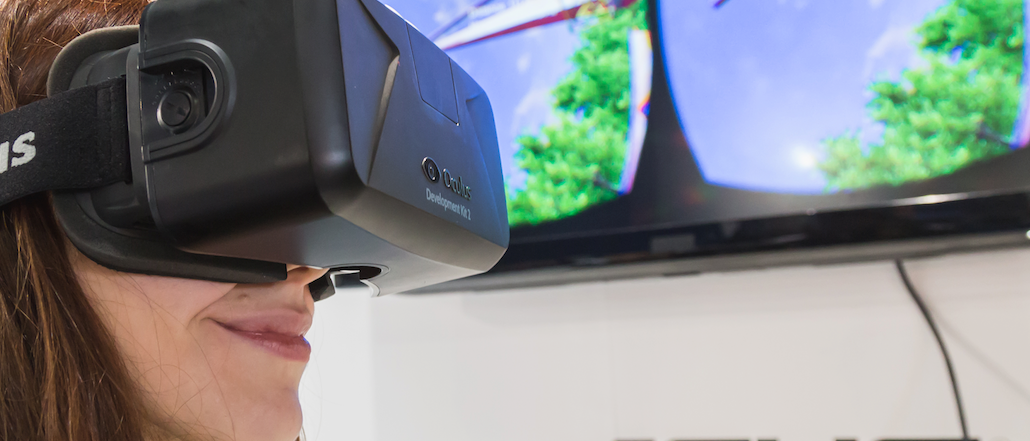Secure your place at the Digiday Media Buying Summit in Nashville, March 2-4
‘People want to play with this thing’: ABC News embraces virtual reality

ABC News says its experimentation with virtual reality is no gimmick. But it’s still treating the technology with an abundance of caution.
This week, the news organization launched its first virtual reality documentary. Tied to a larger report that aired on “Nightline” and “World News Tonight,” the film follows reporter Alexander Marquardt as he explores the city of Damascus and documents efforts to preserve and hide the Syrian capital’s ancient treasures from the hands of ISIS.
It’s the first VR film from ABC News, as well as the first project of its type for a network television news outlet. But before ABC News made the decision to dabble in the new technology, Dan Silver, executive producer of digital for ABC News and one of the people in charge of the project, had to be convinced of VR’s capabilities in documentary filmmaking.
“It’s something I needed to be won over on,” said Silver. “The way I viewed VR in the places I had seen it — it was, ‘Wow, that’s a pretty landscape, there’s a mountain and there’s someone climbing and now I feel like I’m climbing, yay’ — but I was never emotionally invested.”
Silver came to ABC News four months ago from ESPN Films, where he worked on the sports network’s landmark “30 for 30” documentary series.

The Damascus report provided an opportunity to take a documentary-filmmaking approach to VR rather than shooting something in VR just for the sake of something in VR. “Listen, if we put our talent in [the film] and have them be the guide, you as a viewer are still able to be passive and look around but can also be directed,” said Silver. “Once you start doing that, you’re filmmaking, you’re actively engaging [the audience] and deepening the experience.”
It turns out for ABC News shooting for both a TV news report and for the virtual world did not require a lot of additional resources. A camera was supplied by VR tech startup Jaunt. All the crew was required to do was spend a bit more time each location to shoot the VR component, with one producer/editor tasked with putting the film together.
While won over by the prospects of VR as new type of storytelling format, Silver cautions that ABC News is still experimenting with how it can be applied to other news stories.
“People want to play with this thing the way mad scientists want to play with their beakers and potions,” he said. “But we are still telling ABC News stories; VR is just another storytelling tool that we can add to our arsenal.”
And because it’s still early in the game for immersive video, ABC News is more interested in providing people with a new way to get the news. For now, there are no clear-cut success metrics except that those who choose to watch its VR content enjoy it.
“It’s smart. Yes, it’s ABC News innovating in the media space, but it’s for an elevated purpose,” said Michael Fasciano, vp and director of strategy and content at DigitasLBi. “I don’t think they’re just doing something to wave a shiny object out there, it’s actually to help people truly appreciate the stark and dire situation [in Syria].”
Fasciano echoes what many have said about virtual reality as a potentially commercially viable media format: it’s early and the focus should remain on experimentation. For brands, this means creating custom content. “Publishers are not really approaching us to sponsor and integrate within VR experiences,” said Fasciano. “But there has been a noticeable shift in the last three-to-six months in the number of creative brainstorms [we have where] we’re talking about creating owned VR experiences.”
Looking ahead for ABC News, Silver wouldn’t confirm what the outlet’s next VR production would be, but said there are a few coverage areas he’s interested in, including Cuba, the pope’s upcoming visit to the U.S. and the 2016 presidential election.
Some of the projects might be tied to broader reports ABC News is doing, as was the case with the report in Damascus, while others might be produced solely for digital.
“In a lot of ways the brand is an empty vessel that is going to define itself over time,” he said. “And listen, a lot of brands don’t mean anything until they mean something. When I was at Grantland, and at the beginning it didn’t mean anything else but Grantland Rice. Our focus is the best stories with the best people telling them,” he said.
The Damascus film can be accessed on ABCNews.com or by downloading Jaunt’s iOS or Android apps.
Image courtesy of Stefano Tinti / Shutterstock.com
More in Media

Media Briefing: Turning scraped content into paid assets — Amazon and Microsoft build AI marketplaces
Amazon plans an AI content marketplace to join Microsoft’s efforts and pay publishers — but it relies on AI com stop scraping for free.

Overheard at the Digiday AI Marketing Strategies event
Marketers, brands, and tech companies chat in-person at Digiday’s AI Marketing Strategies event about internal friction, how best to use AI tools, and more.

Digiday+ Research: Dow Jones, Business Insider and other publishers on AI-driven search
This report explores how publishers are navigating search as AI reshapes how people access information and how publishers monetize content.





